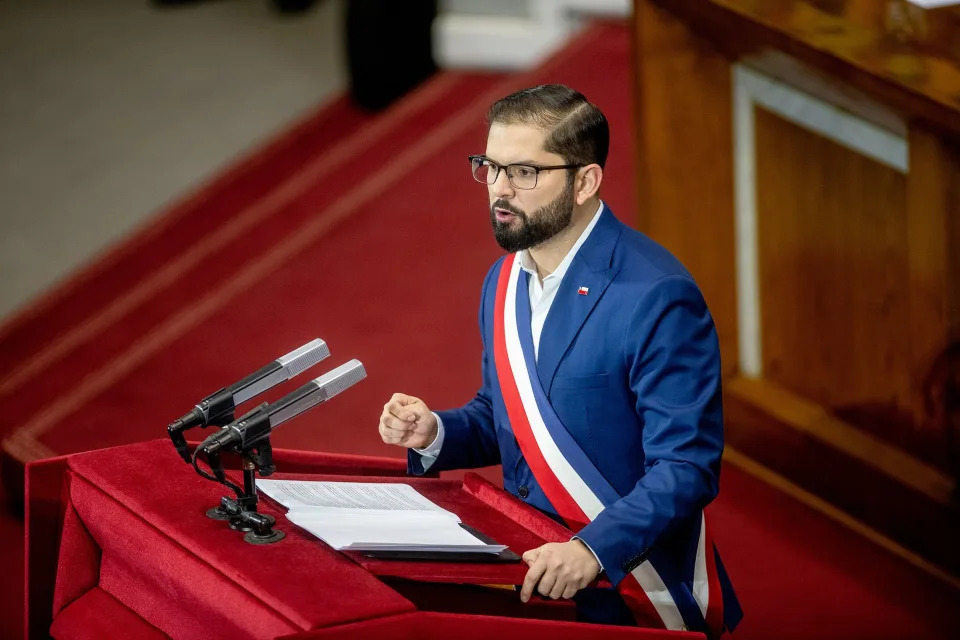Matthew Malinowski
Sat, June 1, 2024

Chile President Gabriel Boric
(Bloomberg) -- Chile President Gabriel Boric said he will introduce a bill to fully legalize abortion and will also accelerate debate on a euthanasia proposal, two plans that face an uphill battle for approval in a divided Congress.
The government will submit legislation on abortion in the second half of this year, Boric said in his annual State of the Nation address given Saturday in Chile’s Congress. The administration will also apply “urgency” to an existing bill on assisted death, he said, thus granting it priority status.
“As president, I am convinced of the need for a democratic debate on the topic of sexual and reproductive rights,” Boric said, prompting a burst of cheers while, at the same time, some lawmakers left the session in protest.
Stakes are high as the former student protest leader moves to rally support with headwinds growing for the approval of his main proposals. Boric has gotten some good news in recent weeks as economic growth forecasts rose while a report showed homicides fell last year. Still, those developments have failed to boost his low approval levels and spur agreements over crucial matters including pensions before political attention shifts to October’s local elections.
Only 30% of the population backs the leftist president, a figure that’s little changed from a year ago, according to a Cadem poll published this week. While voters recognize Boric for promoting gender equality and protecting the environment, they cite crime and clandestine migration as top problems.
“Chilean women deserve their right to decide,” Boric said on abortion in the nationally-televised address, quipping that he wasn’t surprised to see male lawmakers leave the room when he made the announcement.
Women in Chile can currently terminate a pregnancy in cases of rape, when the mother’s life is in danger or if the fetus won’t survive outside the womb.
Our Adversary
In recent weeks, the government has moved to expedite debate on key proposals in Congress. It negotiated a set of economic and public security bills for a fast track, granting them legislative priority in coming weeks.
Last month, the executive branch also applied “utmost urgency” to its pension reform proposal, meaning in theory that the Senate would vote on it within 15 days. Still, that decision sparked outcry from opposition lawmakers who had just agreed to a weeks-long time-frame to review aspects of the bill.
On Saturday, Boric said the government will present bills on income tax reform in the near-term and on collective bargaining by the end of the year. The administration will also expand jails nationwide, modernize police training and increase the number of law enforcement officers on the streets.
“Violence is our adversary,” Boric said.
In September, the government will propose a new financing system that will replace its main student loan program, known as the Credit with State Endorsement (CAE), Boric said. He added that Chile will apply to host the 2036 Olympic Games.
Difficult Times
In May, Boric’s administration raised its 2024 economic growth forecast to 2.7% from 2.5% on stronger-than-expected activity across sectors at the start of the year and higher prices for copper, the nation’s top export. Analysts surveyed by the central bank have lifted their estimates to 2.5% from 1.7% in February.
At the same time, the central bank is extending a cycle of interest rate cuts that have slashed borrowing costs by 5.25 percentage points since last July. The institution sees inflation at the 3% target next year.
“The most difficult times for the economy are over,” Boric said. “We beat inflation, we put our fiscal accounts in order, we worked out the divisions that arose during the constitutional process, foreign direct investment is rising and the world needs our copper, lithium and fruit.”
“Therefore, I tell you all that we have many reasons to look at the immediate future with renewed hope,” he said.
Bloomberg Businessweek
No comments:
Post a Comment